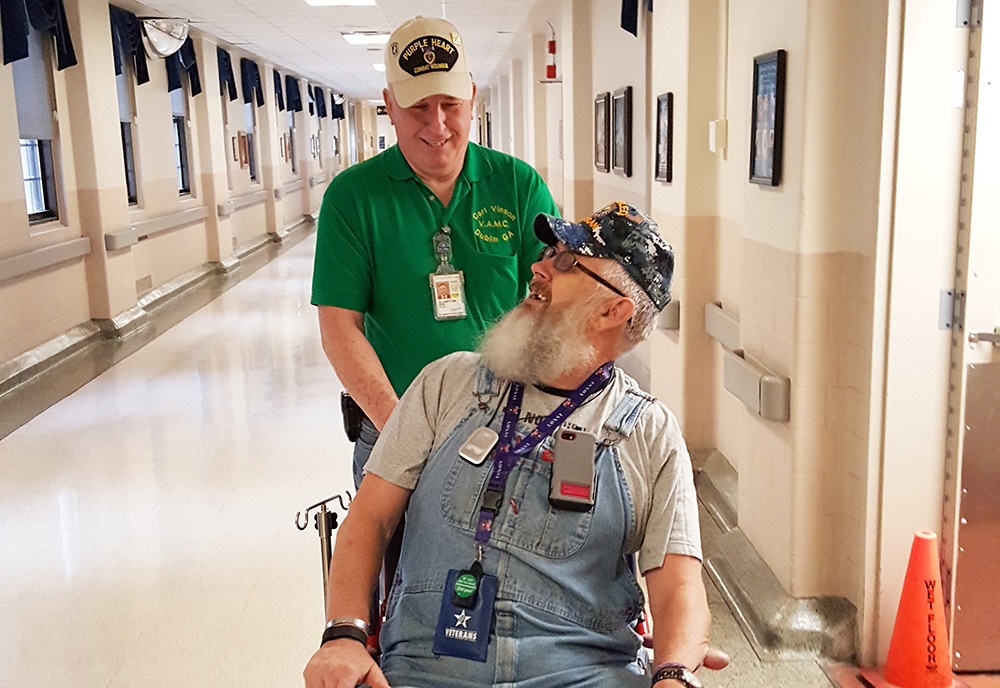Gus Albritton has spent 25 years and 23,000 hours volunteering at the Dublin VA in Georgia.
“I have PTSD, and one day my doctor here at the Dublin VA told me I needed to focus on the future, not the past,” said the 66-year-old Army Veteran “He suggested that I volunteer here once or twice a week to see how I liked it. So I started volunteering.”
As it turned out, he liked it. That was back in October 1991.
Magic Bullet
“Everyone has their own way of dealing with things,” said Albritton, who earned three purple hearts in Vietnam. “Volunteering turned out to be the magic bullet for me. It might not work for everybody, but it worked for me. When I’m focused on helping people, I’m not thinking about a firefight or an ambush or anything else that happened to me in Vietnam. The only time I think about Vietnam now is when I wake up with a nightmare.”
So what’s an average day at the VA look like for Albritton?
“I help Veterans and visitors find their way around our campus here,” he said. “I try to make them feel welcome. If you’re a Veteran walking in the door here, it helps to have another Veteran come up to you and greet you. I’ve been through what they’ve been through, so we connect with each other.
Last Stop: The Basement
“This is a big place,” he continued, “so it’s easy to get intimidated and it’s easy to get lost.”
Albritton laughed, remembering one particular incident that demonstrates how overwhelming the big VA campus in Georgia can be. “One day we had four guys come in here and they took the elevator to the basement by mistake,” he said. “They could find their way around Iraq but they couldn’t find their way around here…
“There’s four miles of hallways on this campus, and it can seem like a maze,” he continued. “But I have it all memorized. There might be a couple of places here I haven’t been to yet, but not many. So if you need to get somewhere, chances are I can get you there. And if you need me to push you there in a wheelchair I’ll do that.”
“That’s why we call Gus our ‘volunteer extraordinaire’,” said Frank Jordan, chief of Stakeholder Relations at the Dublin VA. “Gus is able to establish a rapport with people in about two seconds. It makes a tremendous difference to people, to have someone like Gus give them a warm welcome.”
The Veteran and the Angel
Albritton has no doubt provided warm welcomes to hundreds of Veterans who’ve walked through the doors of the Dublin VA over the years. But one Veteran in particular stands out in his mind.
“We had a guy come through here one day with his wife,” he said. “They were both in their mid-20s, and he was the worst case of traumatic brain injury I’d ever seen. He’d been wounded in Iraq, and all he could do was shuffle along. His arms were just hanging by his sides, and you could see that he’d suffered a really bad head injury…
“He couldn’t speak, he couldn’t communicate,” Albritton said. “So his wife was trying to communicate for him. She looked at me and said, ‘I need some help.’ So everybody sort of jumped in to help them —our mental health folks got involved, our social work people, our disability benefits people, the whole team.”
Albritton said his encounter with the wounded Veteran and his wife was perhaps the most deeply moving experience he’s ever had in 25 years of volunteering. “His wife Cathy is an angel,” he said. “She’s hanging in there with him. I hope she can continue hanging in there.”
The Vietnam Veteran said it’s experiences like this that make him feel fortunate to be doing what he’s doing at the Dublin VA.
“This work keeps me focused on the road in front of me, not the rearview mirror,” he explained. “You can’t go through life staring at the rear-view mirror. As long as I’m helping other Veterans, I’m not staring at the rearview mirror.”
He added: “God has given me a good life, and this hospital has given me a good life.”
Topics in this story
More Stories
The Medical Foster Home program offers Veterans an alternative to nursing homes.
Watch the Under Secretary for Health and a panel of experts discuss VA Health Connect tele-emergency care.
The 2024 National Veteran Suicide Prevention Annual Report provides the foundation for VA’s suicide prevention programs and initiatives.







I too am a Viet Nam era veteran and about 5 years ago started going through a lot of anxiety and depressive episodes. After being let go at my job about 4 years ago, I was drawing unemployment and Social Security but was not able to function outside of my home. Someone asked if I would like to volunteer at my local VA clinic…that was the greatest incentive for getting me out of my house and back into a more positive state of mind and a growing contributor to the intimidating outside world. Thank you VA clinic for allowing me to volunteer and grow!
Thank you for your service and thanks for volunteering!